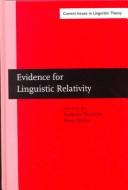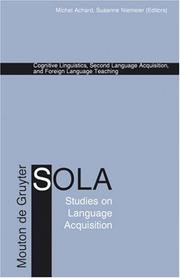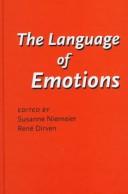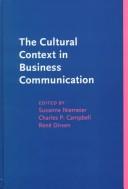| Listing 1 - 10 of 24 | << page >> |
Sort by
|
Book
ISBN: 9783823381303 382338130X Year: 2017 Publisher: Tübingen: Narr Francke Attempto,
Abstract | Keywords | Export | Availability | Bookmark
 Loading...
Loading...Choose an application
- Reference Manager
- EndNote
- RefWorks (Direct export to RefWorks)

ISSN: 03040763 ISBN: 1556199767 9027237050 1283121611 9786613121615 9027284466 9789027284464 9781556199769 9789027237057 9781283121613 6613121614 Year: 2000 Volume: 198 Publisher: Amsterdam ; Philadelphia : John Benjamins Pub. Co.,
Abstract | Keywords | Export | Availability | Bookmark
 Loading...
Loading...Choose an application
- Reference Manager
- EndNote
- RefWorks (Direct export to RefWorks)
This volume has arisen from the 26th International LAUD Symposium on "Humboldt and Whorf Revisited. Universal and Culture-Specific Conceptualizations in Grammar and Lexis". While contrasting two or more languages, the papers in this volume either provide empirical evidence confirming hypotheses related to linguistic relativity, or deal with methodological issues of empirical research.These new approaches to Whorf's hypotheses do not focus on mere theorizing but provide more and more empirical evidence gathered over the last years. They prove in a very sophisticated way that Whorf's ideas were very lucid ones, even if Whorf's insights were framed in a terminology which lacked the flexibility of linguistic categories developed over the last quarter of this century, especially in cognitive linguistics. To date, there is sufficient proof to claim that linguistic relativity is indeed a vital issue, and the current volume confirms a more general trend for rehabilitating Whorf's theory complex and also offers evidence for it. It contains articles written by scholars from various fields of linguistics including phonology, psycholinguistics, language acquisition, historical linguistics, anthropological linguistics and (cross-)cultural semantics, which all contribute to a re-evaluation and partial reformulation of Whorf's thinking.
Historical linguistics --- Discourse analysis --- Linguistique historique --- Analyse du discours --- Congresses --- Congrès --- Sapir-Whorf hypothesis --- Thought and thinking --- Congresses. --- Congrès --- Psycholinguistics --- Sociolinguistics --- Sapir-Whorf hypothesis - Congresses. --- Thought and thinking - Congresses

ISBN: 3110173573 9783110173574 9786612194900 1282194909 3110199858 9783110199857 9781282194908 Year: 2004 Volume: 18 Publisher: Berlin ; New York : Mouton de Gruyter,
Abstract | Keywords | Export | Availability | Bookmark
 Loading...
Loading...Choose an application
- Reference Manager
- EndNote
- RefWorks (Direct export to RefWorks)
This collection of twelve papers demonstrates that the concepts developed within the Cognitive Linguistics movement afford an insightful perspective on several important areas of second language acquisition and pedagogy.In the first part of the book, three papers show how three Cognitive Linguistics constructs provide a useful theoretical frame within which second language acquisition data can be analyzed. First, Talmy's typology of motion events is argued to constitute the base relative to which acquisition discrepancies in motion events are most valuably investigated. Secondly, the notion of "construction" is invoked in order to account for systematic differences between the native and non-native speakers' use of the English verb get. Finally, frequency and similarity effects are shown to play a crucial part in the learning of prepositions in a second language.The second part of the book shows that the key concepts commonly invoked in Cognitive Linguistics analyses allow language teachers to insightfully structure the presentation of problematic material in the foreign language classroom. These concepts include among others polysemy, the figure/ground gestalt, the usage-based conception of grammar, the radial organization of categories, metaphors, and cultural scripts. The Cognitive Linguistics paradigm has already shown itsviability to analyze a wide array of linguistic phenomena.This book establishes its relevance in the areas of second language acquisition and language pedagogy. Its intended public is composed of Cognitive Linguists, Second Language Acquisition specialists, as well as foreign language pedagogy researchers, instructors, and students.
Language and languages --- Second language acquisition --- Cognitive grammar --- Study and teaching --- Psychological aspects --- Psycholinguistics --- Educational sciences --- Grammar --- Sociolinguistics --- Second language acquisition. --- Cognitive grammar. --- Psychological aspects. --- Cognitive linguistics --- Second language learning --- Grammar, Comparative and general --- Language acquisition --- Language and languages - Study and teaching - Psychological aspects --- Cognitive linguistics. --- Language acquisition.

ISBN: 902722160X 1556195141 9786613174765 1283174766 9027283893 9789027221605 9789027283894 9781556195143 Year: 1997 Publisher: Amsterdam ; Philadelphia : J. Benjamins,
Abstract | Keywords | Export | Availability | Bookmark
 Loading...
Loading...Choose an application
- Reference Manager
- EndNote
- RefWorks (Direct export to RefWorks)
Since the celebration of the 100th anniversary of Darwin's The Language of the Emotions in Man and Animals (1872), emotionology has become a respectable and even thriving research domain again. The domain of human emotions is most important for mankind, emotions being right in the center of our daily lives and interests. A key-role in the interdisciplinary scientific debate about emotions has now been accorded to the study of the language of emotions.The present volume offers a new approach to the study of the language of emotions insofar as it presents theories from very differen
Langage et emotions --- Communication non-verbale (Psychologie) --- #SBIB:309H53 --- #SBIB:309H505 --- Niet-verbale communicatie --- Code en boodschap: psychologische, psycho-analytische benadering --- Psycholinguistics --- Sociolinguistics --- Emotions --- Emotions et cognition --- Communication interpersonnelle --- Aspect sociologique --- Emotions and cognition --- Interpersonal communication --- Body language --- Congresses --- Sociological aspects --- Congresses. --- Congrès --- Language and emotions --- Feelings --- Human emotions --- Passions --- Psychology --- Affect (Psychology) --- Affective neuroscience --- Apathy --- Pathognomy --- Cognition and emotions --- Cognition --- Emotions - Congres. --- Emotions et cognition - Congres. --- Emotions - Aspect sociologique - Congres. --- Langage et emotions - Congres. --- Communication interpersonnelle - Congres.
Book
ISSN: 14377829 ISBN: 1299425712 3653011116 3631604718 Year: 2000 Volume: Bd. 5 Publisher: Frankfurt am Main : Peter Lang,
Abstract | Keywords | Export | Availability | Bookmark
 Loading...
Loading...Choose an application
- Reference Manager
- EndNote
- RefWorks (Direct export to RefWorks)
Die Einrichtung bilingualer Bildungsgänge ist zu einer vorrangigen Aufgabe bundesdeutscher Bildungspolitik geworden. Mehr als 500 Schulen in der Bundesrepublik Deutschland dokumentieren dies mit neuen oder neu strukturierten Curricula und Modellen. Sowohl Fremdsprachenunterricht als auch Sachfachunterricht profitieren von dieser Entwicklung. Die inzwischen erfolgte Vorverlagerung der Fremdsprachen in den Primarstufenbereich findet ebenfalls ihren Niederschlag in der bilingualen Bildungslandschaft. So ist es keine Überraschung, dass dieser Band, der als Wegbereiter des bilingualen Unterrichts im deutschsprachigen Raum gilt, auf eine breite Nachfrage gestoßen und zum Standardwerk in einem sich rasch ausbreitenden Lehr- und Forschungsbereich geworden ist. Dem Bedarf an Informationen, an Diskussion und am Austausch über Methoden und Theorien zu bilingualen Bildungsgängen kommen die Autorinnen und Autoren mit dieser verbesserten und erweiterten fünften Auflage nach. Die Bibliographie mit Kommentaren zu den einzelnen Quellen umfasst nunmehr den Zeitraum von 1996 bis 2010. Das Buch ist somit ein einzigartiger Fundus und unentbehrlicher Helfer für Praxis und Forschung.
Book
ISBN: 3631392427 9783631392423 Year: 2002 Publisher: Frankfurt a.M.: Lang,
Abstract | Keywords | Export | Availability | Bookmark
 Loading...
Loading...Choose an application
- Reference Manager
- EndNote
- RefWorks (Direct export to RefWorks)
Book
ISBN: 3631568967 9783631568965 Year: 2008 Publisher: Frankfurt am Main : Lang,
Abstract | Keywords | Export | Availability | Bookmark
 Loading...
Loading...Choose an application
- Reference Manager
- EndNote
- RefWorks (Direct export to RefWorks)
Communicatie in ondernemingen. --- Communicatie in organisaties. --- Communication in organizations --- Discoursanalyse --- Discourse analysis --- Duitse taal --- German language --- Mondelinge communicatie --- Oral communication --- Sociolinguistics. --- Sociolinguïstiek. --- sociale aspecten. --- Social aspects --- discoursanalyse. --- discourse analysis. --- Discourse analysis. --- Social aspects.
Book
ISBN: 9789027239938 9027239932 Year: 2008 Volume: 21 Publisher: Amsterdam: Benjamins,
Abstract | Keywords | Export | Availability | Bookmark
 Loading...
Loading...Choose an application
- Reference Manager
- EndNote
- RefWorks (Direct export to RefWorks)
Sociolinguistics --- Linguistic minorities --- Endangered languages --- Multilingualism
Book
ISBN: 9789027239945 9027239940 Year: 2009 Volume: 22 Publisher: Amsterdam: Benjamins,
Abstract | Keywords | Export | Availability | Bookmark
 Loading...
Loading...Choose an application
- Reference Manager
- EndNote
- RefWorks (Direct export to RefWorks)
Sociolinguistics --- Latin America --- Multilingualism --- Language and languages --- Globalization --- Language policy --- Study and teaching --- Multilingualism - Asia --- Language and languages - Study and teaching - Asia --- Language policy - Asia

ISBN: 1556195303 9027221766 9786613720900 9027273960 1280879599 9789027273963 9789027221766 9781280879593 6613720909 Year: 1998 Publisher: Amsterdam ; Philadelphia, Pa. : John Benjamins Pub.,
Abstract | Keywords | Export | Availability | Bookmark
 Loading...
Loading...Choose an application
- Reference Manager
- EndNote
- RefWorks (Direct export to RefWorks)
The Cultural Context in Business Communication focuses on differences and similarities in business negotiations and written communication in intercultural settings. To set the scene, Edward T. Hall looks back at "culture" as an evolutionary concept and Charles Campbell explains the value of classical rhetoric in contemporary cultures. Further contributions present case studies of cross-cultural encounters and discourse aspects in various settings. Steven Weiss explores the proper character of six cultures: Chinese, French, Japanese, Mexican, Nigerian, and Saudi. Other chapters contras
Business communication --- Business writing --- Communication dans l'entreprise --- Style commercial --- Cross-cultural studies --- Etudes transculturelles --- Business communication -- Cross-cultural studies. --- Business communication. --- Business writing -- Cross-cultural studies. --- Business writing. --- Commerce --- Business & Economics --- Business Communication --- #SBIB:309H250 --- #SBIB:309H023 --- #SBIB:AANKOOP --- #KVHA:Teksttypologie; Engels --- Interne en externe communicatie: algemene werken --- Interculturele en internationale communicatie --- Administrative communication --- Communication, Administrative --- Communication, Business --- Communication, Industrial --- Industrial communication --- Business --- Authorship --- Communication
| Listing 1 - 10 of 24 | << page >> |
Sort by
|

 Search
Search Feedback
Feedback About UniCat
About UniCat  Help
Help News
News